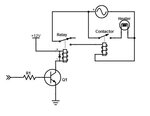GranTotem
Newbie level 5
Hello everyone,
I have a heater at home which I want to turn on every day at 6pm for 30 minutes.
I am planning on using a PIC16f684 to control a 20A relay to turn it on.
Now my question is: Should I use an RTC (DS1307) to tell time or create a very long delay in the program (If possible)?
There would be a couple status LEDs and Buttons as well...
Thanks in advance,
GranTotem
I have a heater at home which I want to turn on every day at 6pm for 30 minutes.
I am planning on using a PIC16f684 to control a 20A relay to turn it on.
Now my question is: Should I use an RTC (DS1307) to tell time or create a very long delay in the program (If possible)?
There would be a couple status LEDs and Buttons as well...
Thanks in advance,
GranTotem

